
HRRAC - UNDP
To address gender inequalities by enabling women and girls to seek assistance, access to services, contribute to peacebuilding and social cohesion.
The specific objectives of the project are:
Promoting women’s role in peacebuilding and social cohesion
HRRAC has a detailed policy on do not harm which oblige HRRAC to avoid any such activity that endanger the safety of the participants or trigger long term negative effect. HRRAC provides its staff the necessary framework to understand the context in which it is operating, understand the interaction between the intervention and the context, and act upon that understanding, in order to avoid negative impacts and maximize positive impacts on the conflict.
HRRAC response will include awareness of cultural practices that may have negative effects on some groups. Examples include: biased targeting of girls, boys or specific groups; unequal opportunities for girls; refusing immunizations; and other forms of discrimination or preferential treatment.
Gender mainstreaming: HRRAC’s proposed projects are shaped by GBA+, which enhances the impact and sustainability of the interventions. Keeping in view the changing context, HRRAC was able to identify the problems and challenges women and other marginalized groups face in the province and proposed solutions that better address needs at the time. Based on its previous experience with women and girls and communities in general, HRRAC further identified the ground realities from our female staff working in the province. Local elders and religious leaders of the target districts were also consulted. They acknowledged the problems women and girls are facing in their society and stressed that the situation needs to change. They assured their support by allowing women and girls to advocate for their rights, and actively participate in the project activities. HRRAC female staff will work with women and girls from the community advocacy groups effectively.
HRRAC engages diverse strata of beneficiaries in the project. Youth makes an integral part of the project and without their engagement in the project, social cohesion will not be achieved.
HRRAC has integrated gender perspectives in the design, implementation, and monitoring and evaluation of the project, so that women and men benefit equally from the outcomes, and inequalities are not perpetuated. The consultations with women and girls, and relevant stakeholders helped in shaping the project goals, objectives, and the activities.